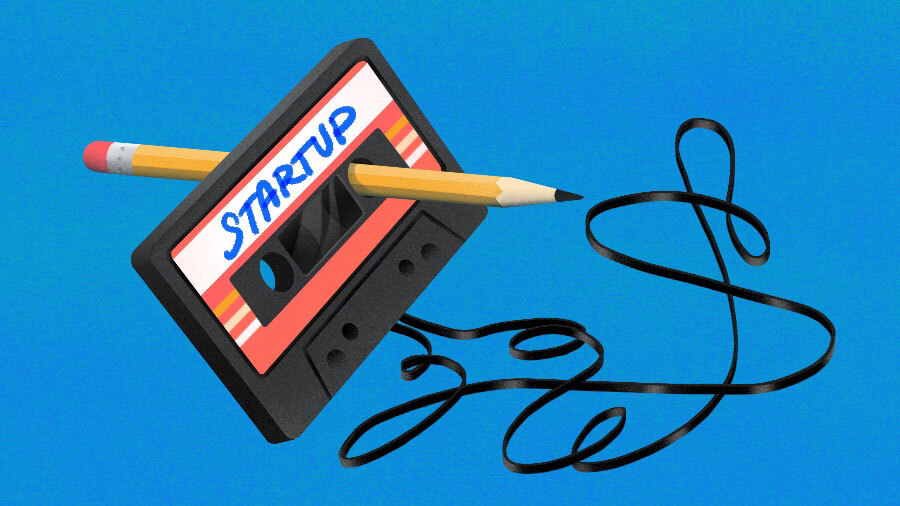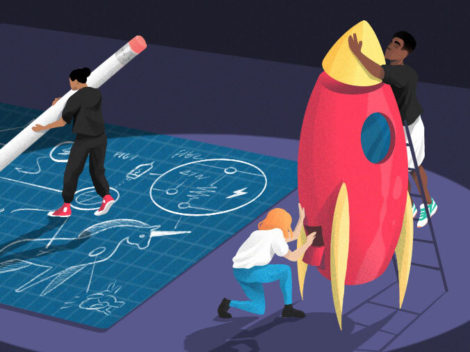It was a Friday the 13th when entrepreneurs David M.M. Taffet and Christie Zwahlen realized they would have to put their startup, Petal, on pause.
Subscribe to the Crunchbase Daily
Just six weeks earlier, in October 2020, Petal had finalized pricing for manufacturing its germ-freezing trash can, which consumers could use to get rid of germs in their trash and eliminate odors. Then, the cost of manufacturing the product shot up by 275 percent, due to the COVID-19 pandemic and increased demand for refrigeration products to store food and vaccines.
When Petal’s manufacturing partner relayed the news to Taffet about the increased cost, the entrepreneur decided to put the startup on pause and wind down operations. Next, he called a team meeting to tell Petal’s roughly 15 employees about the decision and why he made it.
“We knew that there was no way we’d be able to get Petal manufactured, and even if we were able to, we felt it was a lot more important that manufacturing facilities were focused on keeping the vaccine refrigerated, and not garbage,” Zwahlen said.
Although they put Petal on pause and didn’t totally close the company, winding down operations was more or less the same as shutting down a startup, according to Taffet, who has founded (and shut down) startups in the past.
He acknowledged that while Petal still has funding and its patents, the likelihood of the company’s product being out in the world (at least amidst a pandemic) is slim.
The company returned the money to customers who had pre-ordered the product and explained what happened, paid its partners, and laid off employees, Taffet said.
They did pretty much everything to shut down a company besides closing out the LLC.
When startups unwind
The prospect of winding down a company is something many startup founders face. Around 1 in 3 seed-funded startups based in the U.S. between 2011 and 2018 raised post-seed funding, according to Crunchbase data. That means many also fail, but few startup founders spend much time preparing for the not-unlikely prospect of having to unwind their venture.
“The most critical thing that founders don’t think about is the possibility that they’re going to fail,” Zwahlen said. “And they’re not in touch with the reality often. I think a lot of time people will keep pushing forward despite the fact that they shouldn’t be, and it’s hard for people to let go when they’ve invested so much.”
Experts we spoke with agree that failure is part of the startup journey, but say there’s a right way and a wrong way to close an unsuccessful startup.
With that in mind, here’s a checklist to help founders gracefully close down an unsuccessful venture, with the best outcome for customers, employees and investors in mind.
‘Block and tackle’
The process of shutting down a company starts long before the company actually shuts down, according to Nick Selman, who founded the coffee e-commerce marketplace Javaya before shutting down the company in 2019.
Founders should be proactive about keeping a pulse on their company and sharing those updates with people like investors, Selman said.
“A lot of times other people can help you understand what’s going on with your company,” he said.
Selman advises founders to “block and tackle”—be proactive with check-ins like monthly investor updates. Oftentimes founders will stop giving those updates when sales or operations aren’t going well and “that is precisely when you need people in your corner the most,” Selman said.
An experienced founder would be able to see how much cash a company has left and know what would need to be true for the company to extend its runway, raise more money, etc., he added.
“If those things you kind of set out long before that do not become true and you don’t really have a believable plan to make those things true, it’s at that point you should say to yourself, ‘I have employees or I have vendors that are part of my monthly burn. Are there ways as opposed to crash landing this company, to make it so my people have time to find job, time to find new partners, etc?’ ” Selman said.
Making sure employees and partners are paid and have enough advanced warning to find new opportunities is key to a graceful wind down, he said.
After a last ditch effort, consider your sale options
When things get dire, founders should also make one last call to their existing investors to see if they’ll bridge the company, according to Scott Orn, chief operating officer of Kruze Consulting, which provides accounting, finance, tax and HR services to startups. Otherwise, the company’s other options are to be acquired or shut down.
Ideally, startup founders should speak with strategic buyers or companies that might want to make an “acquihire” before shutting down their venture, according to Orn. Management should regularly look at the “cash out date.” If your company is three months out from that date, you need to have a plan and process in place to start shutting down operations.
If you decide to go the acquihire or distressed sale route because investors don’t want to put more money in, be aware of retrades—when an acquirer gives a company a term sheet and then comes in at a lower price at the last minute, knowing the company in trouble has very few options.
If all else fails, start the shut-down process
“It generally takes longer than you expect it to take” to shut down a company, said Curt Mastio, founder of startup-focused accounting firm Founder’s CPA.
Three months is a fair amount of time for a seed-sized company, according to Mastio, while the process for larger or later-stage companies can be more time-consuming and complex.
The most important consideration, according to Orn, is to shut down while the company still has enough money to pay out earned vacation time to employees. If a company shuts down without paying out employees’ PTO, the management team and board of directors are personally liable.
Make sure you consult with an attorney regarding paid vacation time because the laws surrounding PTO payout vary state-by-state, according to Mastio. States could also require companies to give notice to employees before layoffs (California, for example, requires companies of a certain size to give 60 days notice before mass layoffs).
Another task you shouldn’t overlook is filing your company’s last tax return. Founders who don’t shut down their company properly could have their personal bank account levied.
That’s part of why it’s so important to shut down your company while it still has cash. Orn knows of situations in which founders have had to use their personal money to settle company tax matters. That’s especially unfortunate, given how frequently founders take below-market salaries.
Founders should also continue to make payroll tax deposits and payments, according to Mastio. Generally, there are annual and quarterly reports that need to be filed, and companies are still required to do so even if the company shuts down in the middle of a quarter. Also, founders should make any final sales tax payments that are owed and shut down state sales tax accounts, Mastio added.
You also should file the appropriate paperwork to shut down the company with the incorporated state and any states where the company does business. And make sure the company has enough cash on hand to pay an accountant to handle financial paperwork properly, Selman said.
Bottom line: Start shutting down while you still have cash.
Founders also need to file the lesser-known Form 966 with the IRS if they’re dissolving a corporation, according to Mastio.
Providing official documentation to investors that acknowledges what the investors put into the company and states what their shares are worth is also important, Selman said. Whether your company is returning any money to investors or not, the investors need that information for their tax returns.
You’ll also have to send 1099s out to vendors in January if you shut down your startup earlier in the previous year, according to Mastio. So, it’s a good idea to prepare those while going through the shut-down process and then you can wait and send them out in the new year.
Founders also shouldn’t overlook selling any tangible assets, according to Mastio, such as office furniture or equipment. Extra cash helps with the expenses that come with shutting down.
Dealing with investors
Lots of startups fail, but it’s important for investors to be as cordial and understanding as possible toward founders and management, Orn said. The founders could go on to succeed the second time around.
“VCs and any lenders should treat the management team really nicely and with a view toward the future,” Orn said. “Because they need to remember that the management team spent every day for the past four, five years of their life on this. This is their dream.”
Similarly, the management team should be as understanding and constructive toward employees as well. Because if the founders or other executives want to start another company down the line, they may want to hire some of those same employees.
Or, those employees could be contacted as part of the due diligence process for a future company.
“A lot of great entrepreneurs don’t make it the first time,” Orn said. “But the second time they make it because they incorporate all the things they learned or messed up on the first time.”
A good investor will acknowledge that investing in startups is risky and that they do it for reasons other than to get rich, according to Selman.
“A sophisticated investor should not be pressuring you to return the maximum amount of money to them. They would want to see you exhaust all your options … make the best run you can at making your company successful,” he said.
Communication is key
Throughout the whole process of shutting down a startup, honest communication is critical.
When AppLike Group co-founder Jonas Thiemann had to shut down his first startup—a voucher company—around a decade ago, he and his co-founders had to explain their situation to around 100 customers. The customers lost money, and the founders lost some of their personal money.
“You talk to them, you’re transparent about where you stand, they understand it,” Thiemann said. “They weren’t necessarily happy, but they understand you’re a young company.”
One of the biggest mistakes you can make as a founder shutting down a company is not sitting down with your co-founders and discussing what went wrong because of personal mistakes, failures or weaknesses, Thiemann said. Those are lessons to take to any future ventures.
“The overarching thing is just how you communicate the message to everyone and your timing in doing so,” Zwahlen said. “Those other details, you can figure them out. But it’s really about the relationships you’ve built with your employees and your partners and your customers. How you wind that down and explain what’s happening, that’s the most important thing.”
Illustration: Dom Guzman

Stay up to date with recent funding rounds, acquisitions, and more with the Crunchbase Daily.




![Illustration of a guy watering plants with a blocked hose - Global [Dom Guzman]](https://news.crunchbase.com/wp-content/uploads/quarterly-global-3-300x168.jpg)
67.1K Followers